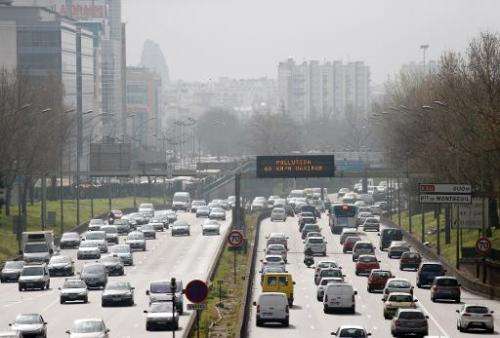Polluted Paris prepares for partial car ban (Update)

Paris on Monday launches alternate driving days for the first time in nearly 20 years to tackle dangerous air pollution levels amid controversy on whether the ban is warranted or will yield results.
The restrictions in the French capital and 22 surrounding areas will come into force from 5:30 am (0430 GMT) and could be extended until Tuesday, officials said.
About 700 police officers will be deployed to man 60 checkpoints to ensure that only cars and motorcycles with number plates ending in odd digits are on the roads.
Electric and hybrid cars will be exempted from the ban as well as any vehicle carrying three people or more.
Parking will be free on Monday for vehicles with even number plates, the Paris city hall said, calling on residents to consult carpooling or car-sharing sites to work out their commutes and rides.
The restrictions will be reviewed on a daily basis to determine if an extension is necessary. The ban means that drivers can only use their cars or motorcycles every other day.
It is only the first time since 1997 that the French authorities have ever resorted to such a drastic measure.
The government made the announcement on Saturday after pollution particulates in the air exceeded safe levels for five straight days in Paris and its environs.
All public transport was made free over the weekend to persuade residents to leave their cars at home. It will remain free as long as the alternate driving days remain in force.
Ban is 'hasty, ineffective'
France's Automobile Club Association (ACA), which counts some 760,000 members, denounced the move as has "hasty, ineffective" and "bound to lead to chaos."
"This measure had no effect in any country where it was introduced," said ACA head Didier Bollecker.
"Once drivers are being targeted even when heating is even more polluting, but no one is asking for heating to be used on alternate days."
By Saturday the number of pollution particulates in the air had fallen slightly after hitting a high of 180 microgrammes per cubic metre—well over double the safe limit—on Friday.
These so-called PM10 particulates are created by vehicles, heating and heavy industry, with the safe limit set at 80 per cubic metre.
Ecology Minister Philippe Martin said he understood the "difficulties, the irritation and even anger" over the move, adding: "But we just had to take this decision."
Martin said similar measures in 1997 "had yielded results," adding that he hoped that the number of vehicles on the roads would be "significantly lower" on Monday, without giving a figure.
The smoggy conditions have been caused by a combination of cold nights and warm days, which have prevented pollution from dispersing.
The pollution particulates in the air can cause asthma attacks as well as respiratory and heart problems.
The World Health Organisation has said finer particulates—known as PM2.5—are cancer-causing.
© 2014 AFP


















